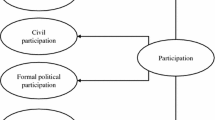Abstract
Developed empowerment theory and replicated previous research on citizen participation and perceived control. Few investigators have designed studies that specifically test empowerment theory. This research further extends a theoretical model of psychological empowerment that includes intrapersonal, interactional, and behavioral components, by studying a large randomly selected urban and suburban community sample and examining race differences. Results suggest that one underlying dimension that combines different measures of perceived control may be interpreted as the intrapersonal component of psychological empowerment, because it distinguishes groups defined by their level of participation in community organizations and activities (behavioral component). The association found between the intrapersonal and behavioral components is consistent with empowerment theory. Interaction effects between race groups and participation suggest that participation may be more strongly associated with the intrapersonal component of psychological empowerment for African Americans than for white individuals. Implications for empowerment theory and intervention design are discussed.
Similar content being viewed by others
References
Ahlbrandt, R. S., Jr. (1984).Neighborhoods, people, and community. New York: Plenum Press.
Aldenderfer, M. S., & Blashfield, R. K (1984).Cluster analysis. Beverly Hills: Sage.
Averred, B. (1974).Cluster analysis. London: Heinemann.
Berger, P. J., & Neuhaus, R. J. (1977).To empower people: The role of mediating structures in public policy. Washington, DC: American Enterprise Institute for Public Policy Research.
Bray, J. H., & Maxwell, S. E. (1982). Analyzing and interpreting significant MANOVAS.Review of Educational Research, 52, 340–367.
Carr, T. H., Dixon, M. C., & Ogles, R. M. (1976). Perceptions of community life which distinguish between participants and nonparticipants in a neighborhood self-help organization.American Journal of Community Psychology, 4, 357–366.
Chavis, D. M., & Wandersman, A. (1990). Sense of community in the urban environment: A catalyst for participation and community development.American Journal of Community Psychology, 18, 55–81.
Cole, R. L. (1981). Participation in community service organizations.Journal of Community Action, 1, 53–60.
Cornell Empowerment Group (1989). Empowerment and family support.Networking Bulletin, 1, 1–23.
Denney, W. M. (1979). Participant citizenship in a marginal group: Union membership of California farm workers.American Journal of Political Science, 23, 330–337.
Florin, P., & Wandersman, A. (1984). Cognitive social learning and participation in community development.American Journal of Community Psychology, 12, 689–708.
Freire, P. (1973).Education for critical consciousness. New York: Seabury.
Gershick, T. J., Israel, B. I., & Checkoway, B. (1990).Means of empowerment in individuals, organizations, and communities: Report on a retrieval conference. Ann Arbor: University of Michigan, Center for Research on Social Organization, Program on Conflict Management Alternatives.
Kelly, J. G. (1986). The ecology of prevention: Illustrating mental health consultation.Prevention in Human Services, 4, 1–36.
Kieffer, C. H. (1984). Citizen empowerment: A developmental perspective.Prevention in Human Services, 3, 9–36.
Kish, L. (1965).Survey Sampling. New York: Wiley.
Langer, E. J., & Rodin, J. (1976). The effects of choice and enhanced personal responsibility for the aged: A field experiment in an institutional setting.Journal of Personality and Social Psychology, 34, 191–198.
McCarthy, J. D., & Zald, M. N. (1977). Resource mobilization and social movements: A partial theory.American Journal of Sociology, 82, 1212–1241.
Paulhus, D. (1983). Sphere-specific measures of perceived control.Journal of Personality and Social Psychology, 44, 1253–1265.
Perkins, D. D., Florin, P., Rich, R. C., Wandersman, A., & Chavis, D. M. (1990). Participation and the social and physical environment of residential block: Crime and community context.American Journal of Community Psychology, 18, 55–82.
Prestby, J. E., Wandersman, A., Florin, P., Rich, R., & Chavis, D. (1990). Benefits, costs, incentive management, and participation in voluntary organizations: A means to understanding and promoting empowerment.American Journal of Community Psychology, 18, 117–149.
Rappaport, J. (1981). In praise of paradox: A social policy of empowerment over prevention.American Journal of Community Psychology, 9, 1–25.
Rappaport, J. (1984). Studies in empowerment: Introduction to the issue.Prevention in Human Services, 3, 1–7.
Rappaport, J. (1985). The power of empowerment language.Social Policy, 16, 15–21.
Rappaport, J. (1987). Terms of empowerment/exemplars of prevention: Toward a theory for community psychology.American Journal of Community Psychology, 15, 121–148.
Sue, S., & Zane, N. (1980). Learned helplessness theory and community psychology. In M. S. Gibbs, J. R. Lachenmeyer, & J. Sigal (Eds.), Community psychology: Theoretical and empirical approaches (pp. 121–143). New York: Gardner.
Schulz, A. J., & Israel, B. I. (1990).Empowerment and empowering processes: A theory development seminar series, academic year 1988–1989. Unpublished manuscript, University of Michigan, Center for Research on Social Organization, Program on Conflict Management Alternatives, Ann Arbor.
Stone, R. A., & Levine, A. G. (1985). Reactions to collective stress: Correlates of active citizen participation. Prevention in Human Services, 4, 153–177.
Swift, C., & Levin, G. (1987). Empowerment: An emerging mental health technology.Journal of Primary Prevention, 8, 71–94.
Tatsuoka, M. M. (1971).Multivariate analysis: Techniques for educational and psychological research. New York: Wiley.
Zimmerman, M. A. (1990a). Taking aim on empowerment research: On the distinction between psychological and individual conceptions.American Journal of Community Psychology, 18, 169–177.
Zimmerman, M. A. (1990b). Toward a theory of learned hopefulness: A structural model analysis of participation and empowerment.Journal of Research in Personality, 24, 71–86.
Zimmerman, M. A. (in press). Empowerment theory: Psychological, organizational and community levels of analysis. In J. Rappaport & E. Seidman (Eds.),The handbook of community psychology, New York: Plenum Press.
Zimmerman, M. A., & Rappaport, J. (1988). Citizen participation, perceived control, and psychological empowerment.American Journal of Community Psychology, 16, 725–750.
Zimmerman, M. A., & Zahniser, J. H. (1991). Refinements of sphere-specific measures of perceived control: Development of a socio-political control scale.Journal of Community Psychology, 19, 189–204.
Author information
Authors and Affiliations
Additional information
The authors express appreciation to Steven Rosenstone who was the Principal Investigator for the Detroit Area Study from which the data for our study is based. We also thank Deborah A. Salem and the anonymous reviewers for their thoughtful comments on earlier drafts of this paper.
Rights and permissions
About this article
Cite this article
Zimmerman, M.A., Israel, B.A., Schulz, A. et al. Further explorations in empowerment theory: An empirical analysis of psychological empowerment. Am J Commun Psychol 20, 707–727 (1992). https://doi.org/10.1007/BF01312604
Issue Date:
DOI: https://doi.org/10.1007/BF01312604




